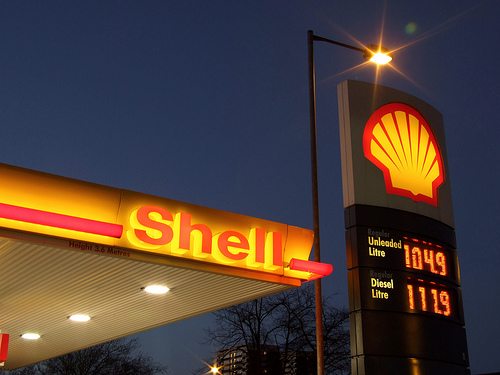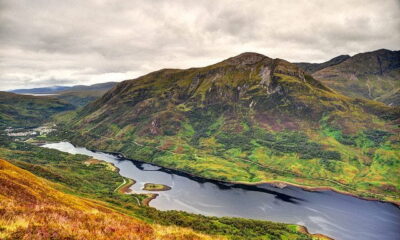

Energy
Shell abandons Arctic oil drilling: indications not sufficient to warrant further exploration
Shell announced today that it was abandoning further work on the controversial Burger J exploration well, located in Alaska’s Chukchi Sea. The Burger J well is approximately 150 miles from Barrow, Alaska, in about 150 feet of water.
Shell drilled the well to a total depth of 6,800 feet this summer. They found indications of oil and gas in the Burger J well, but these are “not sufficient to warrant further exploration in the Burger prospect”. The well will be sealed and abandoned in accordance with U.S. regulations.
“The Shell Alaska team has operated safely and exceptionally well in every aspect of this year’s exploration program,” said Marvin Odum, Director, Shell Upstream Americas. “Shell continues to see important exploration potential in the basin, and the area is likely to ultimately be of strategic importance to Alaska and the US. However, this is a clearly disappointing exploration outcome for this part of the basin.”
Shell will now cease further exploration activity in offshore Alaska for the foreseeable future. This decision reflects both the Burger J well result, the high costs associated with the project, and the challenging and unpredictable federal regulatory environment in offshore Alaska.
The company expects to take financial charges as a result of this announcement. The balance sheet carrying value of Shell’s Alaska position is approximately $3.0 billion, with approximately a further $1.1 billion of future contractual commitments. An update will be provided with the third quarter 2015 results.
Shell holds a 100% working interest in 275 Outer Continental Shelf blocks in the Chukchi Sea. Shell says operations will continue to safely de-mobilize people and equipment from the Chukchi Sea.
Carbon Tracker CEO Anthony Hobley said: “Shell’s decision to halt exploration in the Arctic is a win for common sense and capital discipline, but why did it take $7bn of shareholders’ money to come to this view? Analysis by Carbon Tracker and others clearly showed that Arctic oil needs much higher prices to give investors a decent return. Yet the decision appears a reluctant pause as Shell suggests it would have continued to drill if it had found more oil and gas and it has only halted exploration ‘for the foreseeable future’.
“Shell still does not fully grasp either the need for real capital discipline or that the energy sector is undergoing fundamental technological transformation and it risks wasting billions more of shareholder money.
“Today for example Shell will announce the launch of a new Energy Transitions Commission which dangerously ignores the pace of change being demanded by Governments to keep the world within UN’s 2⁰C climate change target. Plans that would see half our power still generated by fossil fuels in 2050 risk putting us on a path to 4⁰C of warming.
“We question the credibility and independence of an Energy Transitions Commission funded by fossil fuel incumbents and Shell’s track record on climate change does not inspire us with confidence.”
Also commenting on Royal Dutch Shell’s announcement that it will cease oil exploration in offshore Alaska for the foreseeable future, Rod Downie, WWF Polar Programme Manager said: “Today the Arctic has seen a reprieve from Shell’s irresponsible drilling. Their reckless $7 billion pursuit of oil in this fragile icy habitat puts local people and wildlife, such as polar bears, at risk.
“Shell should now set out to concerned shareholders and the public how it intends to transition its business model to one which is compatible with tackling climate change.”
Commenting on news that Shell has stopped Arctic oil and gas exploration off the coast of Alaska after “disappointing” results, Friends of the Earth’s CEO Craig Bennett said: “This is wonderful news for the people and wildlife of the Arctic region, but it must become a turning point in the fight to prevent catastrophic climate change.
“Just think what the $7bn Shell spent in the Arctic could have done for our climate and energy system if it had been invested in solar, wind and tidal power, rather than being wasted on looking for yet more oil that we cannot burn?
“The UK Government must see the writing on the wall, and switch its support from fracking and oil to the renewable energy industry – or risk being stuck with outdated, redundant, unusable technologies.”
Greenpeace International Executive Director Kumi Naidoo said: “This is a defining day for the Arctic. It’s a huge victory for the millions of people who stood up against Shell and a disaster for other oil companies with interests in the region. Shell has gambled big and lost big, both in terms of financial cost and its public reputation. This has become the most controversial oil project in the world, and despite its bluster Shell has been forced to walk away with nothing.
“It’s time to make the Arctic ocean off limits to all oil companies. This may be the best chance we get to create permanent protection for the Arctic and make the switch to renewable energy instead. If we are serious about dealing with climate change we will need to completely change our current way of thinking. Drilling in the melting Arctic is not compatible with this shift.
“Greenpeace’s campaign to save the Arctic will continue with passion and increased strength. We are campaigning for a protected sanctuary in international waters around the North Pole, and we hope that vision is one step closer after today.”
Reacting to news that Shell is ending its Arctic drilling programme, Greenpeace UK executive director John Sauven said: “Big oil has sustained an unmitigated defeat. They had a budget of billions, we had a movement of millions. The ‘unpredictable regulatory environment’ that forced Shell out of the Arctic is otherwise known as massive pressure from more than 7 million people. For three years we faced them down, and the people won.
“The Save the Arctic movement has exacted a huge reputational price from Shell for its Arctic drilling programme. And as the company went another year without striking oil, that price finally became too high. They’re pulling out.
“Now President Obama should use his remaining months in office to say that no other oil company will be licenced to drill in the American Arctic.
“Soon the nations of the world will gather in Paris to negotiate a deal on climate change. Shell’s defeat shows which way the wind is blowing. If a movement of seven million people can beat one of world’s biggest energy companies, think what we can do when we come together in our tens and hundreds of millions. This is a moment to appreciate that when we assert our power, we can win extraordinary victories in the fight against climate change.”






























